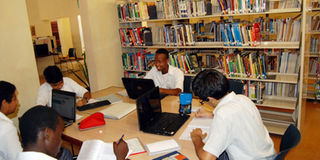IRUTI: The luminous essence of English literature

Students read in a library. It is the work of a teacher of literature to decide what texts suit their learners. PHOTO | FILE
What you need to know:
- Literature is a mirror image of the cultural practices, norms and taboos of the different cultural groups
- The teacher is in a position to select texts that students will be able to analyse, internalise, and be able to manoeuvre into the beauty of literature
- Works of literature keep history alive
Teachers of literature are enormously exposed to a number of literary set texts. They are the proposed text by the education system as a way of promoting reading culture in students. There are selected texts that serve the needs of both university and secondary school learners.
These set texts are classified into different genres of literature. They include prose, drama, poetry, non-fiction and media.
BEAUTY OF LITERATURE
It is therefore the work of a teacher to decide what texts suit their learners. Through this scrutiny, the teacher is in a position to select texts that students will be able to analyse, internalise, and be able to manoeuvre into the beauty of literature.
For effective selection, a teacher should be widely read, well-exposed and familiar with almost all genres of literature. They are in a position to identify other literary forms, including popular and classical literature.
Some of these forms have great artistic qualities and convey an expression of life, truth and beauty. Although popular literature is seen as infamous, it includes great works of prolific writers who dedicated their lives entirely to make literature what it is today. The works of William Shakespeare and Charles Dickens are among them, together with J K Rowling, famously known for her Harry Potter series.
A teacher of literature needs to be widely read to understand and appreciate the various cultures of their students.
CRITICAL THINKING
Literature is a mirror image of the cultural practices, norms and taboos of the different cultural groups. It is also the store house of cultural teaching and knowledge.
The subject also builds critical thinking skills, which enable a teacher to carry out analysis, synthesis and empathy of any literary text.
Literature enhances in a teacher the knowledge and understanding of the world. The knowledge is important as it enables a teacher to tackle different areas in life and be able to employ his basic human capacity to employ them.
It equips a teacher with the prowess of better writing, as they are able to manipulate words, resulting in an aesthetic work of art.
Additionally, a widely read teacher of literature is adequately equipped to address humanity. All literature is an overflow of human emotions put forth in an vibrant manner.
Such a teacher understands that imperfection and normality may be boring, hence they accommodate each spontaneous behaviour exhibited by their students.
Finally, literature enables a teacher to view the world in a different light and splash colours where it is dull. They have a chance to experience the past as if it is happening in the present.
Works of literature keep history alive.
***
Biko Iruti is a student of English and Literature at Moi University.




